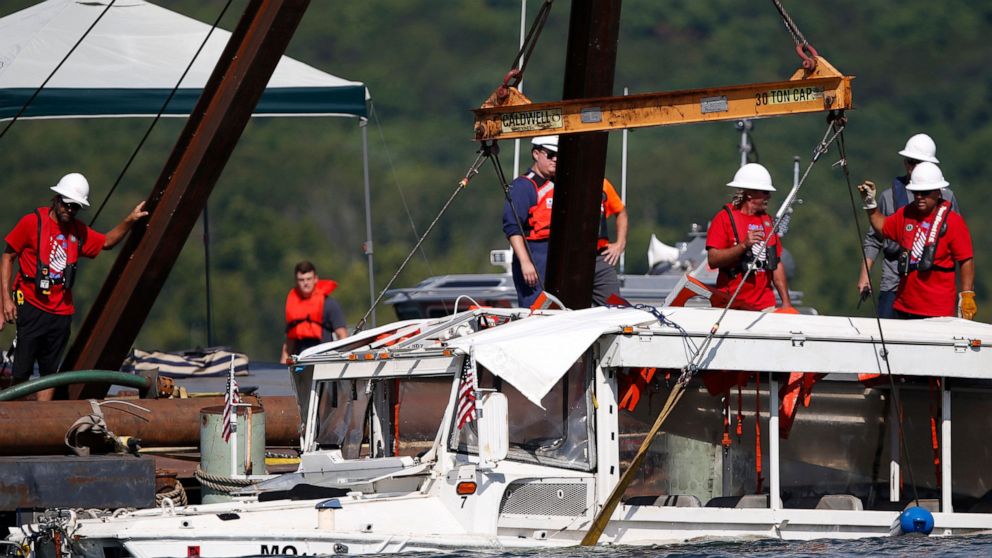[ad_1]
National federal safety regulators say actions by the owners of a tourist boat that sank in Missouri in 2018 and the U.S. Coast Guard contributed to the tragedy that killed 17 people
5 min read
LIBERTY, Mo. —
A duck boat sinking on a Missouri Lake that killed 17 people two summers ago likely could have been prevented if the U.S. Coast Guard had followed recommendations made for years to improve the safety of such tourist attractions, federal safety regulators said Tuesday.
The National Transportation Safety Board released the findings of its investigation into the July 2018 tragedy, when a Ride the Ducks vehicle sank during a severe and sudden storm on Table Rock Lake near Branson.
Investigators believe that if the Coast Guard had followed recommendations for small passenger boats that the NTSB made after a similar boat sank in Arkansas in 1999, killing 13 people, the Missouri boat “likely would not have sunk,” said Brian Young, an NTSB accident investigator.
Young also said the agency’s staff believes Ride The Ducks should have suspended water operations that day because of the severe weather forecast.
Among the files released Tuesday was a letter the NTSB received last week from the Coast Guard agreeing that canopies and side curtains should be removed from amphibious tour vehicles known as stretch duck boats.
NTSB Chairman Robert Sumwalt said at a news conference that although the Coast Guard’s recommendations don’t have the force of a regulation, he’s “very optimistic” the agency is committed to improving small passenger boat safety. Duck boats should not be allowed to operate again until the recommendations are fully implemented, he said.
The NTSB said the probable causes for the accident included the decision by Ripley Entertainment Inc., which purchased the Ride the Ducks attraction in 2017, to operate the lake tours despite a severe thunderstorm warning. The vessel flooded through an air intake hatch on the bow that was not weather tight.
It also blamed the Coast Guard’s failure to require sufficient buoyancy in amphibious vehicles, and its failure to address emergency exits on such vehicles with fixed canopies contributed to the sinking and loss of life. The findings echoed a report the NTSB released in November.
The April 15 letter from Daniel Abel, vice admiral of the Coast Guard, said the Guard agreed with an NTSB recommendation to remove canopies, side curtains and associated framing from the duck boats to improve passengers’ chances of escape during emergencies.
The Coast Guard has issued a Marine Safety Information Bulletin, the first step in the process.
Ripley Entertainment, which owns the boats, has settled 31 lawsuits filed by survivors or relatives of those who died. The dead included nine members of one family from Indianapolis. Other victims were from Missouri, Illinois and Arkansas.
A spokeswoman for Ripley Entertainment did not immediately return a message seeking comment.
Robert Mongeluzzi whose firm represents nearly two dozen people who were aboard the boat, including the Coleman family of Indianapolis that lost nine members, commended the NTSB findings and said it supports the victims’ calls to prevent duck boats from ever being used again.
“Duck Boats are death traps which, when flooded, become sinking coffins,” Mongeluzzi said. “The Coast Guard and Duck Boat industry have the blood of these Branson victims on their hands for continuing to ignore the warnings. Hopefully this time, they will listen.”
Ripley suspended operations of the boats after the accident and it remains unclear if they will ever return to the lake.
The NTSB issued three recommendations to the Coast Guard and three to Ripley Entertainment suggesting changes to improve the boats’ buoyancy and passengers’ ability to escape, and better training and guidance for boat operators to respond to severe weather.
Two Missouri State Highway Patrol investigators interviewed duck boat Capt. Scott McKee the day after the accident. McKee said he took the boat into the water because radar indicated the storm was “quite a ways away,” but it quickly turned from calm to turbulent.
“I never expected it to get this rough,” McKee said. “Never had any — I’ve never seen it get that rough.”
NTSB members were unable to interview McKee because of ongoing criminal investigations. McKee, of Verona, is charged with 17 counts of misconduct, negligence or inattention to duty. Two Ripley executives are also charged with misconduct and neglect.
Marcel Muise, marine accident investigator, told board members that it appeared McKee didn’t have the information he needed to make a proper decision about going onto the lake. He noted the lake was clear when McKee arrived, and the three other duck boats on the water indicated there was no cause for concern about the weather.
Some NTSB board members were skeptical, saying the National Weather Service issued the storm report in plenty of time to stop the boat from going in the water.
———
Salter reported from O’Fallon, Missouri.
[ad_2]
Source link

